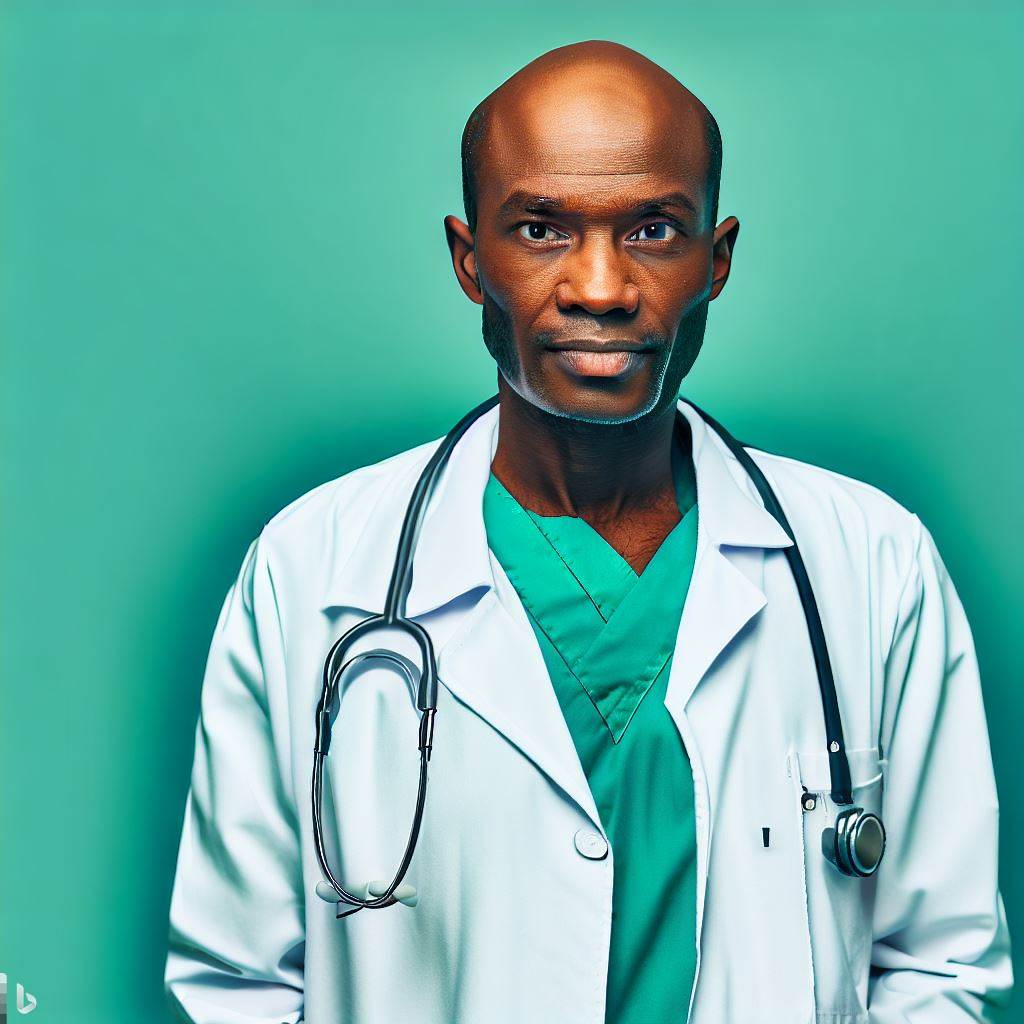Introduction
Healthcare professionals play a vital role in Nigeria, ensuring the well-being of its population. In Nigeria, the role of doctors is indispensable in safeguarding the health and well-being of the population.
As frontline healthcare professionals, they dedicate themselves to diagnosing, treating, and preventing various medical conditions, making a significant impact on the lives of patients and communities.
This blog post aims to provide an in-depth understanding of the doctor profession in Nigeria. We will delve into the journey of becoming a doctor, the rigorous education and training required, and the challenges they may face during their career.
Moreover, we will explore the vast array of opportunities that await aspiring doctors in Nigeria, from working in hospitals, clinics, and public health institutions to specializing in various medical fields. In addition to the challenges, this post will highlight the rewarding aspects of being a doctor.
Whether you are considering a career in medicine or simply curious about the lives of doctors in Nigeria, this article will provide valuable insights into the noble and vital profession that forms the backbone of the country’s healthcare system.
Overview of the healthcare system in Nigeria
Brief history of the healthcare system in Nigeria
Traditionally, Nigeria’s healthcare practices were deeply rooted in indigenous knowledge and relied on traditional healers, herbal remedies, and spiritual beliefs to treat various ailments.
With the arrival of colonial powers, Western medicine began to make inroads into the country during the late 19th and early 20th centuries.
Missionary groups played a significant role in establishing the first modern hospitals and medical facilities, introducing formal medical education and training, and promoting Western healthcare practices.
After Nigeria gained independence in 1960, there was a concerted effort to expand and improve the healthcare system. The government launched various initiatives, including establishing primary healthcare centers across the country to enhance healthcare access for all citizens.
The 1978 Alma-Ata Declaration further emphasized the importance of primary healthcare as a key to achieving health for all. Unfortunately, Nigeria has faced challenges in its healthcare journey that have continued to hinder its growth and potential.
The challenges faced by the healthcare system
The Nigerian healthcare system faces numerous challenges, such as inadequate funding, poor infrastructure, and a shortage of healthcare professionals. Nigeria needs well-trained doctors to overcome the healthcare system challenges and provide quality healthcare services to its citizens.
The healthcare system in Nigeria has undergone significant changes throughout its history. Initially, traditional medicine played a vital role in healthcare, with remedies and practices passed down through generations.
However, as the country progressed, modern medicine gained prominence, leading to establishing of a more formal healthcare system. The Nigerian healthcare system faces several challenges that hinder its ability to effectively provide healthcare services to its population.
One of the major issues is inadequate funding. The budget allocated to the healthcare sector is often insufficient to meet the growing needs of the population, resulting in a lack of essential equipment, medications, and facilities.
Poor infrastructure is another significant challenge. Many healthcare facilities suffer from dilapidated buildings, limited space, and outdated medical equipment.
This hampers medical professionals’ ability to deliver quality care and forces patients to seek healthcare elsewhere, often at higher costs.
The shortage of healthcare professionals, especially well-trained doctors, is a critical problem. Nigeria has one of the lowest doctor-patient ratios globally, making access to medical care difficult for many citizens.
The limited number of doctors also means an increased workload, leading to burnout and decreased quality of care.
The need for well-trained doctors in the country
Addressing these challenges necessitates the presence of well-trained doctors in Nigeria. Highly skilled doctors are crucial for providing accurate diagnoses, appropriate treatment plans, and necessary surgical interventions.
They can also contribute to medical research, help develop innovative healthcare solutions, and mentor future generations of doctors.
Moreover, well-trained doctors are more likely to stay in Nigeria and serve their communities, reducing the brain drain phenomenon. Retaining talented medical professionals within the country is crucial in maintaining a sustainable healthcare system and meeting the healthcare needs of the population.
To ensure the availability of well-trained doctors, Nigeria must focus on improving medical education and training programs. Quality medical schools should be established, equipped with modern facilities, and staffed with experienced faculty members.
Additionally, continuous professional development programs should be provided to practicing doctors to enhance their knowledge and skills. The government should also prioritize healthcare funding to increase the number of healthcare professionals.
Allocating a higher budget to the healthcare sector will facilitate the recruitment of more doctors as well as the retention and motivation of existing ones.
In essence, Nigeria’s healthcare system has faced various challenges over the years, including inadequate funding, poor infrastructure, and a shortage of healthcare professionals, particularly well-trained doctors.
Addressing these challenges is crucial for the country to provide quality healthcare services to its population.
By investing in medical education and training, improving infrastructure, and allocating sufficient funding, Nigeria can overcome these obstacles and build a robust healthcare system that meets the needs of its citizens.
Read: Insights into the Nigerian Optical Engineering Industry
Educational requirements to become a doctor in Nigeria
To become a doctor in Nigeria, there are specific educational paths that aspiring individuals must follow. These paths involve a combination of academic qualifications, entrance exams, and rigorous training.
Here is a detailed look at the educational requirements to become a doctor in Nigeria:
Specific educational path
To become a doctor in Nigeria, one must first complete secondary education, obtaining a minimum of five credits in subjects such as English, Mathematics, Physics, Chemistry, and Biology. These subjects form the foundation for medical studies.
Entrance exams and qualifications for admission
After obtaining the necessary credits in secondary education, aspiring doctors must sit for the Unified Tertiary Matriculation Examination (UTME) conducted by the Joint Admissions and Matriculation Board (JAMB).
This exam evaluates candidates’ knowledge in relevant subjects and is a requirement for admission into Nigerian universities, including medical schools. To gain admission into a medical school in Nigeria, candidates must achieve a high UTME score and meet the specific cutoff marks set by the university.
Although the general cutoff mark specified by JAMB is between 180-200, the most reputable universities in Nigeria may require nearly 300 to study Medicine and Surgery.
Additionally, some medical schools may require candidates to pass a supplementary exam or interview to assess their suitability for the medical profession.
Duration of medical school and rigorous curriculum:
Once admitted to medical school, students embark on a rigorous academic journey that typically lasts for six years. The curriculum is designed to provide aspiring doctors with a comprehensive understanding of medical sciences and the practical skills required for patient care.
During the first three years of medical school, students undergo preclinical studies, focusing on basic medical sciences such as anatomy, biochemistry, physiology, and pathology. These foundational subjects lay the groundwork for clinical practice.
The final three years of medical school are dedicated to clinical rotations. Students gain hands-on experience by rotating through various hospital departments, such as internal medicine, surgery, pediatrics, obstetrics and gynecology, and more.
This allows them to apply their theoretical knowledge in real-life medical scenarios and develop essential clinical skills.
Additional requirements
Apart from the academic curriculum, medical students in Nigeria are required to complete mandatory supervised internships after graduating from medical school. This internship period, typically lasting for one year, allows new doctors to gain practical experience and further enhance their skills.
After completing the internship, doctors are eligible to register with the Medical and Dental Council of Nigeria (MDCN) and obtain a practicing license. This registration and licensure process is a regulatory measure to ensure that all practicing doctors meet the required standards of competence and ethics.
Basically, the path to becoming a doctor in Nigeria involves fulfilling specific educational requirements.
This includes obtaining the necessary credits in secondary education, achieving a high UTME score, gaining admission to a medical school, completing a comprehensive six-year curriculum, and undergoing a supervised internship.
By meeting these requirements, aspiring doctors can embark on a fulfilling career dedicated to improving the health and well-being of the Nigerian population.
Read: Nigeria’s Military: Service Branches Explained
Training and Specialization
Medical training in Nigeria goes through several vital phases for doctors to become experts in their field. These phases include undergraduate education, internship, and residency.
Undergraduate Training
Undergraduate training, also known as medical school, is the first phase of medical education. During this phase, students learn the basic sciences, such as anatomy, physiology, biochemistry, and pharmacology.
Medical students also gain clinical skills by attending lectures, participating in laboratory sessions, and engaging in clinical rotations. The undergraduate training typically lasts for six years, depending on the university.
Internship
After completing medical school, graduates must undergo a one-year internship in a hospital. During this period, they work under the supervision of experienced doctors to gain practical experience.
Interns rotate through different medical specialties, such as pediatrics, surgery, obstetrics, and internal medicine. This training helps doctors apply their theoretical knowledge to real-life patient care.
Residency
Residency is a postgraduate medical training program that follows the internship phase. It is a more specialized training period that allows doctors to choose a specific medical field.
The duration of residency varies depending on the specialty, ranging from three to seven years. During residency, doctors acquire in-depth knowledge, practical skills, and professional experience.
Specialization in the medical field is crucial for doctors as it allows them to focus on a particular area of medicine. It enhances their expertise, skills, and overall contribution to patient care.
Here are some reasons why specialization is important:
Enhanced Knowledge and Skills
Specialization enables doctors to gain in-depth knowledge and expertise in a specific field. They become well-versed in the latest advancements, technologies, and treatments of their chosen specialty.
These specialized skills enhance their ability to diagnose and treat complex medical conditions.
Improved Patient Care
Specialized doctors provide better quality care as they have a deeper understanding of their specific field. They are equipped to handle complex cases, offer targeted treatments, and ensure patient safety.
Specialists are more familiar with potential complications, enabling them to provide optimal care.
Career Advancement and Opportunities
Specialization opens doors to various career advancement opportunities for doctors. Specialists can pursue teaching, research, consultancy, and leadership roles.
They also have the option to work in specialized healthcare centers or establish their private practice.
In Nigeria, doctors can choose from a wide range of specialization options. Some popular medical specialties include:
Pediatrics
Pediatricians specialize in the medical care of infants, children, and adolescents. They provide preventive care, diagnose and treat illnesses, and track the growth and development of their young patients.
Surgery
Surgeons specialize in performing surgical procedures to treat diseases, injuries, and deformities. They may choose to specialize in areas such as neurosurgery, orthopedic surgery, cardiovascular surgery, or plastic surgery, among others.
Obstetrics and Gynecology (OB/GYN)
OB/GYN specialists focus on women’s reproductive health, including pregnancy, childbirth, and gynecological disorders. They provide prenatal care, perform deliveries, and offer treatment options for various gynecological conditions.
Internal Medicine
Internists specialize in the diagnosis and non-surgical treatment of adult diseases. They manage chronic conditions, conduct health screenings, and coordinate care for patients with multiple medical issues.
Anesthesiology
Anesthesiologists specialize in administering anesthesia and managing pain during surgical procedures. They closely monitor patients’ vital signs, ensure their safety during surgery, and provide pain relief post-operatively.
These are just a few examples of the specialization options available for doctors in Nigeria. Each specialty requires additional training and certification beyond the residency phase, ensuring comprehensive expertise in the chosen field.
Basically, medical training in Nigeria involves several phases, including undergraduate education, internship, and residency. Specialization plays a crucial role in enhancing doctors’ knowledge and skills, improving patient care, and offering career advancement opportunities.
Nigerian doctors have various lucrative specialization options to choose from, allowing them to make a significant impact in their respective fields.
Read: Government and Military in Nigeria: A Symbiotic Relationship

Work Environment for Doctors in Nigeria
When it comes to the work environment for doctors in Nigeria, there are various factors that shape their experiences. From working conditions to challenges faced, let’s take an insightful look at what it’s like to be a doctor in Nigeria.
Working Conditions and Challenges Faced by Doctors in Nigeria
- Long working hours are a common challenge faced by doctors in Nigeria.
- Many doctors work in overcrowded hospitals with insufficient medical equipment and resources.
- Inadequate staffing often leads to an overwhelming workload for doctors.
- Poor infrastructure and lack of maintenance in healthcare facilities pose additional challenges.
- Security concerns for doctors arise due to prevalent cases of violence against medical professionals.
Salary, Workload, and Work-Life Balance
Doctors in Nigeria face issues regarding salaries, as they often receive lower compensation compared to their counterparts abroad. The workload can be extremely demanding, leaving minimal time for personal life and self-care.
Sadly, long hours and high stress levels can significantly affect the work-life balance of doctors. There are also limited opportunities for professional development and career advancement which may further impact their motivation and job satisfaction.
Significance of Doctors in Rural Areas and Underserved Communities
Doctors play a crucial role in providing healthcare services in rural areas and underserved communities. These areas often lack adequate medical facilities and healthcare professionals.
Doctors working in rural areas face unique challenges, such as limited resources and infrastructure. Their presence helps bridge the gap in healthcare access and improves the overall well-being of these communities.
Efforts to encourage doctors to work in rural areas include providing incentives and support systems.
In short, the work environment for doctors in Nigeria comes with various challenges and rewards. While they face issues such as long working hours, inadequate resources, and low salaries, their presence is vital in improving healthcare access, particularly in rural areas and underserved communities.
It is crucial to address these challenges and provide better working conditions and support to ensure the well-being of doctors and the overall healthcare system in Nigeria.
Read: Pioneers of Optical Engineering in Nigeria’s Tech Scene
Learn More: Nigeria’s Social Work Framework: An Analysis
Career prospects for doctors in Nigeria
Being a doctor in Nigeria comes with a wide range of career opportunities, each offering its unique advantages and challenges.
In this section, we will discuss the various career prospects available for doctors in Nigeria, shed light on the potential for growth and advancement in the profession, and highlight the increasing demand for doctors due to population growth.
Career Opportunities for Doctors in Nigeria:
- General Practitioners (GPs): GPs are the primary healthcare providers and often serve as the first point of contact for patients.
- Specialists: Doctors can choose to specialize in various fields such as cardiology, neurology, surgery, pediatrics, and more.
- Consultants: Consultants are experienced specialists who provide expert advice and opinions to other healthcare professionals.
- Academic Medicine: Doctors can pursue a career in academia, teaching and conducting research in medical schools and universities.
- Public Health Experts: There is a growing demand for doctors to work in public health, focusing on preventive medicine and community healthcare initiatives.
- Hospital Administration: Doctors can take up administrative roles in hospitals, managing operations, budgets, and ensuring quality healthcare delivery.
- Medical Writing and Journalism: Writing medical blogs and articles or contributing to healthcare journalism is a career possibility for doctors with excellent communication skills.
- Medical Research: Doctors can contribute to cutting-edge medical research, working towards advancements in treatments, drugs, and therapies.
Potential for Growth and Advancement
The medical profession in Nigeria offers immense potential for growth and advancement. As doctors gain experience and expertise in their specialized fields, they can climb the ladder of success:
- Professional Development: Continuous learning through workshops, conferences, and certifications expands knowledge and opens doors to new opportunities.
- Specialization: With further training and experience, doctors can become highly specialized experts, commanding respect and higher remuneration.
- Leadership Roles: Experienced doctors can take up leadership positions in healthcare institutions, managing teams and shaping healthcare policies.
- Private Practice: Many doctors establish their own private clinics, giving them independence and the potential for greater financial stability.
- International Opportunities: Nigerian doctors have the chance to pursue lucrative career options abroad, exposing them to different healthcare systems and environments.
Increasing Demand for Doctors due to Population Growth
Nigeria’s population is rapidly growing, and with it comes an increasing demand for healthcare professionals:
- Urbanization: Urban areas experience a concentration of population, leading to a higher demand for doctors and quality healthcare.
- Epidemics and Diseases: The prevalence of diseases such as malaria, HIV/AIDS, and non-communicable diseases necessitates more doctors to provide care and treatment.
- Health Infrastructure Development: As Nigeria continues to invest in healthcare infrastructure, there is a need for doctors to fill new hospitals and healthcare facilities.
- Government Initiatives: The Nigerian government is committed to improving healthcare access, leading to more job opportunities for doctors.
- Health Insurance Schemes: The implementation of health insurance programs increases the demand for doctors, as more people can afford medical services.
In a nutshell, the doctor profession in Nigeria offers diverse career prospects, with opportunities for growth, advancement, and making a meaningful impact on society’s health.
With the increasing demand for doctors due to population growth, the profession continues to be a vital pillar of Nigeria’s healthcare system.
Read: Top Institutions to Study Phlebotomy in Nigeria
The impact of doctors on the healthcare system in Nigeria
Doctors play a crucial role in improving and maintaining the healthcare system in Nigeria. Their impact extends beyond patient care and encompasses areas such as research and public health initiatives.
Role of Doctors in Improving the Healthcare System
- Doctors are responsible for diagnosing, treating, and managing various medical conditions.
- They play a vital role in preventing diseases through immunizations, health education, and preventive screenings.
- Doctors collaborate with other healthcare professionals to develop comprehensive treatment plans and ensure the best possible outcomes for patients.
- They advocate for health policy changes, promoting initiatives that address community health needs.
- Doctors serve as mentors and educators, training the next generation of medical professionals and disseminating knowledge.
Contributions of Doctors to Patient Care
Doctors provide compassionate and patient-centered care, addressing the physical, emotional, and psychological needs of individuals. They offer personalized treatment plans based on evidence-based medicine, ensuring the highest quality of care.
Additionally, doctors communicate effectively with patients, explaining complex medical terms and procedures in a clear and understandable manner. They actively involve patients in decision-making processes, respecting their autonomy and preferences.
Furthermore, doctors prioritize continuity of care, following up with patients to monitor their progress and make necessary adjustments to treatment plans.
Doctors and Research
Doctors contribute to medical research by conducting clinical trials, observational studies, and laboratory experiments. They explore new treatments, diagnostic techniques, and preventive strategies to advance medical knowledge.
Doctors disseminate research findings through publications, presentations at conferences, and collaborations with other researchers. They also participate in peer review processes, ensuring the integrity and validity of scientific publications.
Doctors constantly update their knowledge and skills based on the latest research findings, providing cutting-edge care to patients.
Role of Doctors in Public Health Initiatives
- Participate in public health campaigns to raise awareness about preventive measures, disease outbreaks, and health promotion.
- Collaborate with government agencies, NGOs, and community organizations to implement disease control programs.
- Conduct epidemiological investigations and surveillance to track the spread of diseases and identify risk factors.
- Provide expertise in disaster management, coordinating medical responses during emergencies or natural disasters.
- Contribute to health policy development, advocating for equitable access to healthcare services for all segments of society.
Importance of Ethical and Professional Conduct in the Medical Field
- Doctors are bound by ethical principles such as beneficence, non-maleficence, respect for autonomy, and justice.
- They must uphold patient confidentiality, maintain trust, and respect the rights and dignity of individuals.
- Doctors adhere to professional codes of conduct, ensuring competence, integrity, and continuous professional development.
- They engage in lifelong learning, attending conferences, workshops, and pursuing further education to stay current in their practice.
- Doctors engage in self-reflection and peer assessment to identify areas for improvement and ensure the delivery of high-quality care.
Overall, doctors in Nigeria play a pivotal role in improving the healthcare system. Through their contributions to patient care, research, and public health initiatives, they strive to provide the best possible care, advance medical knowledge, and promote the well-being of the Nigerian population.
Read: The Journey to Becoming a Registered Nurse in Nigeria
Conclusion
In conclusion, this article shed light on the crucial role of doctors in Nigeria’s healthcare system, despite facing challenges such as inadequate infrastructure and resources.
These dedicated professionals are on the frontlines, working tirelessly to save lives and improve the nation’s health. Their expertise and commitment are indispensable, and the healthcare system would be at risk without them.
It is vital to recognize and appreciate the sacrifices doctors and healthcare professionals make daily. The long hours and emotional toll they endure require our utmost respect and support.
Showing gratitude and acknowledging their vital contributions can go a long way in motivating and uplifting these unsung heroes. Together, let us value and honor the invaluable work of doctors in Nigeria, ensuring a healthier and more compassionate society for all.




